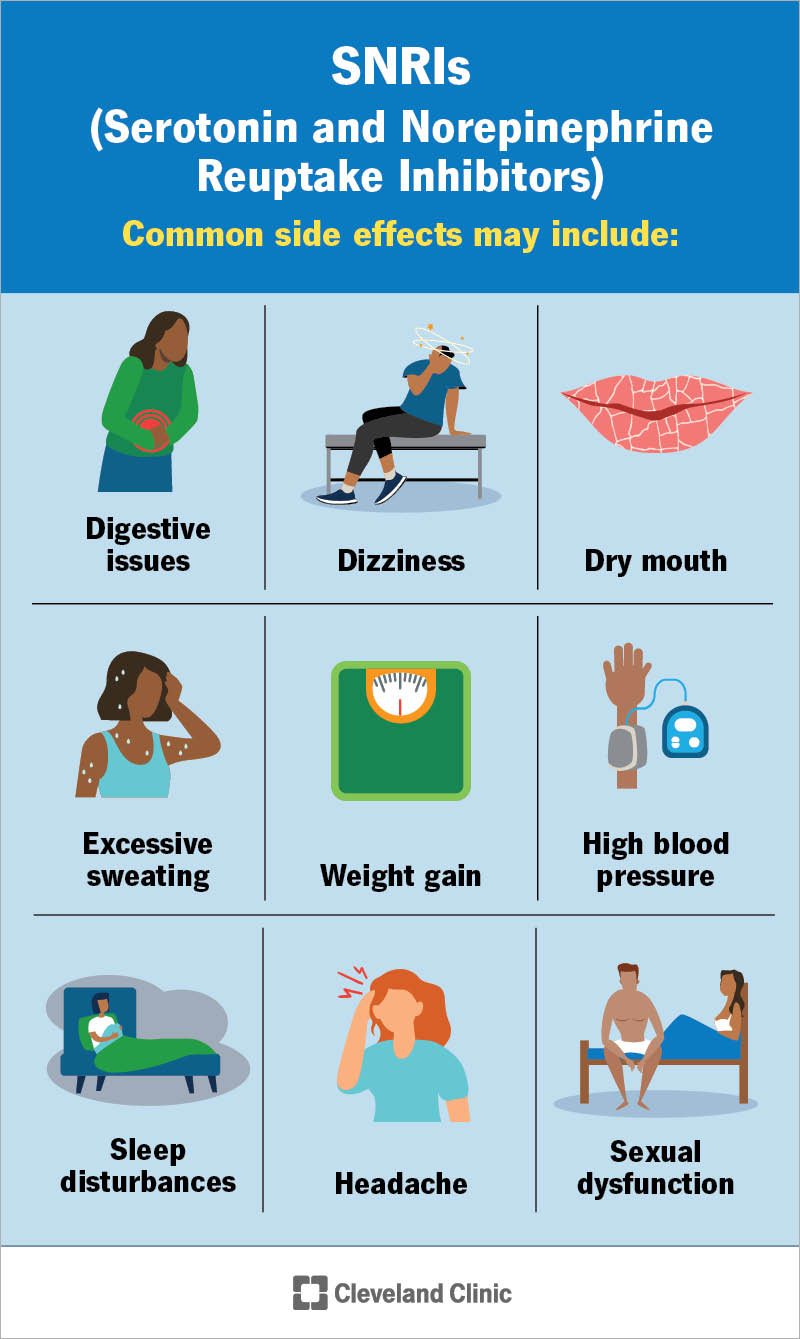SNRIs (serotonin and norepinephrine reuptake inhibitors) are a type of FDA-approved antidepressant. They help improve mood, reduce anxiety and relieve chronic pain by boosting certain brain chemicals. While they can be highly effective, they also come with possible side effects. It’s important to work closely with your provider while taking these.
Advertisement
Cleveland Clinic is a non-profit academic medical center. Advertising on our site helps support our mission. We do not endorse non-Cleveland Clinic products or services. Policy
Video content: This video is available to watch online.
View video online (https://cdnapisec.kaltura.com/p/2207941/sp/220794100/playManifest/entryId/1_fodp2r8i/flavorId/1_5f3sgelj/format/url/protocol/https/a.mp4)
Learn the difference between SSRIs and SNRIs.
SNRIs (serotonin and norepinephrine reuptake inhibitors) are a class of antidepressants that work by changing the activity of serotonin and norepinephrine. These are chemicals that can affect your mood, as well as many other bodily and mental functions.
Advertisement
Cleveland Clinic is a non-profit academic medical center. Advertising on our site helps support our mission. We do not endorse non-Cleveland Clinic products or services. Policy
These medications are often used to treat conditions like depression, anxiety and chronic pain.
There are different types of SNRIs available in the United States. These include:
The U.S. Food and Drug Administration (FDA) has approved different SNRIs for the following conditions:
Healthcare providers sometimes prescribe these medications for other conditions, too. This is an “off-label” use. Examples include:
Serotonin and norepinephrine are neurotransmitters. These are molecules that dictate how different regions of your brain talk to each other. Normally, after neurotransmitters deliver their message, your brain cells reabsorb them. This is a process called reuptake. SNRIs block the reabsorption of serotonin and norepinephrine, allowing them to remain active in your brain for a longer period of time.
Advertisement
Serotonin and norepinephrine play a role in the regulation of:

Image content: This image is available to view online.
View image online (https://my.clevelandclinic.org/-/scassets/images/org/health/articles/serotonin-norepinephrine-reuptake-inhibitors)
These medications help manage symptoms of many mental health conditions, as well as certain physical health conditions. These medications often work well when paired with therapy. SNRIs are usually well tolerated, with mild or minimal side effects.
Common side effects may include:
Each medication has different side effects. Ask your provider or pharmacist for more information about each type.
While these medications are generally safe, they may cause rare but serious complications in some cases:
If you’re thinking about suicide, you can reach out for help. Let your provider know. You can also call or text 988 (U.S.) to reach the Suicide and Crisis Lifeline. Someone is available to talk to you 24/7.
Some medications may interact with SNRIs, including:
This isn’t a complete list. Talk to your healthcare provider about all the medications and supplements you currently take. They’ll let you know if an SNRI is the safest option to manage your symptoms.
If you need surgery while taking an SNRI, tell your surgeon. These medications may change your blood pressure while you’re asleep and under anesthesia. Your provider may need to adjust your dose before the procedure. Never change or stop your medication unless your provider says it’s safe.
It’s best to avoid alcohol while taking antidepressants, including SNRIs. Alcohol is a depressant and might interfere with how well the medication works. It can sometimes make depression symptoms worse. If you have concerns about drinking, talk to your provider.
Advertisement
SNRIs may also pose risks during pregnancy. Some studies show they can affect a developing fetus. But stopping treatment suddenly can be harmful, too, as untreated depression or anxiety may worsen. If you’re pregnant or planning to become pregnant, talk with your provider. They’ll go over the possible risks and benefits and help you choose the safest option.
If you need or want to stop taking an SNRI, your provider will help you gradually reduce your dose. Quitting abruptly can lead to a group of symptoms known as antidepressant discontinuation syndrome. These symptoms typically happen if you’ve been on the medication for six weeks or longer.
SNRIs take time to work. Most people start to notice benefits after four to six weeks at the right dose. For some, it may take nine to 12 weeks. If you don’t feel better by then, check in with your provider. They may suggest adjusting your treatment plan.
SNRIs (serotonin and norepinephrine reuptake inhibitors) are commonly prescribed, and for good reason. These medications can help with more than just depression, from easing nerve pain to managing anxiety or menopause symptoms. If you’re considering an SNRI or already taking one, know that your provider is your best resource. They can answer your questions, help with side effects and make sure the medicine is right for you.
Advertisement

Sign up for our Health Essentials emails for expert guidance on nutrition, fitness, sleep, skin care and more.
Learn more about the Health Library and our editorial process.
Cleveland Clinic’s health articles are based on evidence-backed information and review by medical professionals to ensure accuracy, reliability and up-to-date clinical standards.
Cleveland Clinic’s health articles are based on evidence-backed information and review by medical professionals to ensure accuracy, reliability and up-to-date clinical standards.
Anxiety disorders can affect your life in many ways. Cleveland Clinic mental health experts can help you manage anxiety so you’re back in control.
